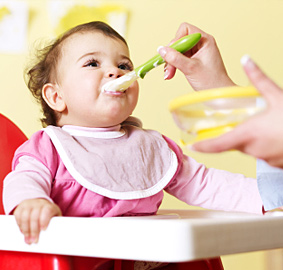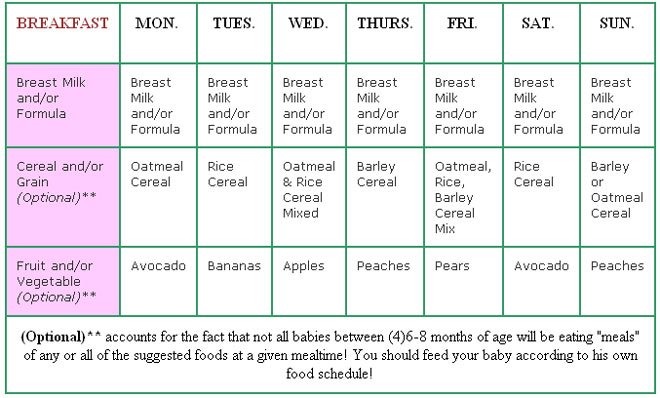Do You Know When to Feed Baby Food?
Once you have come to know when do babies Crawl, you need to think how better you can get your babies to grow up. Getting your babies fed and knowing about their food hobbits is one of the key things that you must know. Do you know When to Feed Baby Food? Well! Before that, you should be concerned about few more things. Most children this age are acquainted with substantial foods. Specialists suggest steadily presenting high foods when a baby is around six months old, contingent upon the baby’s availability and nutritious needs.
Is My Baby Ready to Eat Solids or When to Feed Baby?
By what method would you be able to tell if your baby is made of solids? Here are a couple of indications When to Feed Baby Food:
Is your child’s tongue-push reflex gone or reduced? This reflex, which keeps children from gagging, likewise makes them push food out of their mouths.
Can your baby bolster his or her head? To eat substantial food, a newborn child needs excellent head and neck control and ought to have the capacity to sit up.
Is your baby keen on food? A 6-month-old baby who gazes and snatches at your food at dinnertime is unmistakably prepared for some assortment in the food division.
If your specialist gives the approval however your child appears to be baffled or indifferent as you’re presenting high foods, have a go at holding up a couple of days or even weeks before attempting once more. Since solids are just a supplement right now, breast milk and recipe will even now meet your baby’s fundamental healthy needs.
How and When to Feed Baby With Solid Food?
When to Feed Baby is a general question to ask every time! You need your child to be somewhat hungry, yet not full scale starving; you might need to give your baby a chance to breastfeed a while, or give part of the typical container.
Have your baby sit bolstered in your lap or an upright newborn child seat. Babies, who sit well, more often than not around six months, can be put in a high seat with a safety belt.
Most children’s first food is somewhat pressed fortified baby single-grain coat blended with breast milk or recipe. Place the spoon close to your child’s lips, and let the baby smell and taste. Try not to be amazed if this first spoonful is rejected. Hold up a moment and attempt once more. Most food offered to your baby at this age will wind up on the baby’s button, kiddies apron, or high-seat plate. Once more, this is only a presentation.
Try not to add grain to your baby’s jug unless your specialist educates you to do as such, as this can make babies get to be overweight and doesn’t offer the baby some assistance with learning how to eat strong foods.
Once your minimal one gets the hang of eating grain off a spoon, it might be an ideal opportunity to present single-fixing pureed vegetables, organic product, or meat. The request in which foods are introduced doesn’t make a difference yet while offering new foods, go moderate. Introduce one food at once and hold up a few days before having a go at something else new. This permits you to identify foods that your baby might be susceptible to.
Feeding Babies at 4 Months of Age or When to Feed Baby Food at age 4?
- Watch for indications of status in your 4-6 month-old. Offer meager, fluid like pureed baby oat, natural product, or veggies by spoon once day by day at the outset. Never push a spoon through a baby’s pressed together or shut lips. If they dismiss their head from you, regard them and attempt again tomorrow. There is NO Surge beginning solids and might be defensive advantages of holding up even until six months. If your baby is solely mind nourished, you can consider holding up until six months of age to offer correlative foods. Chat with your doc about conceivable extra iron supplementation at or around four months of age that they might propose. Here’s the a la mode AAP articulation on breastfeeding proposals. In the arrangement, they state, “Reciprocal food rich in iron and zinc ought to be presented at around six months of age. Supplementation of oral iron drops before six months might be expected to bolster iron stores.” A pleasant synopsis in The Divider Road Diary highlights some great knowledge about the absence of a surge.
- There is no single, impeccable first food. We regularly used to prescribe rice grain as a close immaculate first food since you could blend chips with breast milk or recipe to a pleasant, fluid like consistency. In any case, with new data out this previous year about arsenic levels in rice oat, it’s presently suggested we just nourish babies’ rice once a week by week. So begin with an oat, an organic product, or a veggie as a first food. Present the same food day after day for a day or two. Allow your baby to investigate the new composition and flavor. At that point, three days after the fact, add to another new food. That route in the uncommon instance of a hypersensitivity or narrow-mindedness, you’ll recognize what food to fault.
- A study distributed in Dec 2012 randomized youngsters at four months to get correlative provisions notwithstanding bosom milk. Development was awesome. Of the 100 mother-newborn child combines, the development was the same however press levels were better in those with food began. Luckily, press levels were sufficient in the only center sustained newborn children, as well. Most basic foods included following four months of age were oat, recipe and natural products puree.
- Starting integral foods at 4months of age might decrease hypersensitivities and asthma. A late 2013 study in The Diary of Hypersensitivity and Clinical Immunology found that including wheat, rye, oats and grain before 5.5 months, fish before nine months, and egg before 11 months was connected with lower rates of asthma, against susceptible rhinitis, and emotional reaction in the blood (IgE refinement). The concentrate additionally found that children who got breast milk for 9 ½ months or all the more likewise had lower rates of asthma. It might be more critical to what extent you breastfeed versus solely breastfeeding and grouped food decisions with regards to sensitivity security.
- For broad data on diagnosing and forestalling food, sensitivities look at this exhaustive report from The National Establishment for Hypersensitivity and Irresistible Sickness.
- Prevention of Hypersensitive Illness through Nourishment is another 2013 exhaustive survey from The American Institute of Sensitivity, Asthma, and Immunology.
Conclusion:
Your baby might take a short time to “realize” how to eat solids but you can’t simply ignore When to Feed Baby Food. Amid these months regardless you’ll be giving the typical feedings of breast milk or recipe so don’t be concerned if your baby declines certain foods at first or doesn’t appear to be intrigued. It might simply require some investment.






